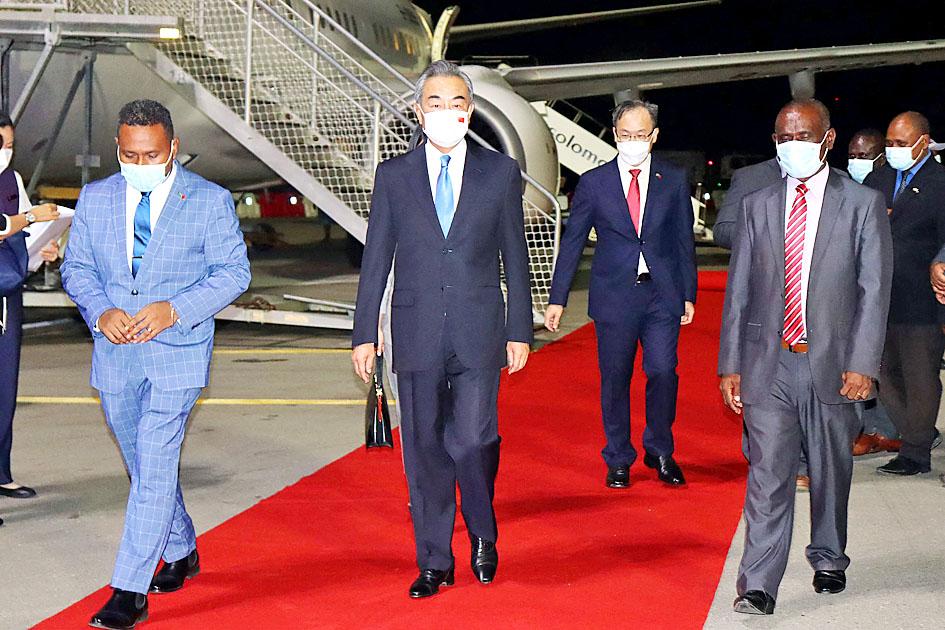The Ministry of Foreign Affairs yesterday called on Pacific island countries to heed China’s true purpose behind its aid, as Chinese Minister of Foreign Affairs Wang Yi (王毅) arrived in the Solomon Islands at the start of an eight-nation tour.
His visit came amid growing concerns about Beijing’s military and financial ambitions in the South Pacific region, after a draft document was leaked showing that he hoped to strike a sweeping agreement with 10 Pacific nations on everything from security to fisheries.
In Taipei, Ministry of Foreign Affairs deputy spokesman Tsuei Ching-lin (崔靜麟) said that it would continue to pay close attention to Wang’s visit.

Photo: AFP
Since China launched its Belt and Road Initiative, countries such as Sri Lanka have been caught in a debt trap, and hit by major crises to their economies and social development, he said.
Tensions in the region have been heightened by Beijing’s ambition to expand its power through military strategies, a clear example of which is China signing a security deal with the Solomon Islands, he added.
The ministry called on countries in the region to recognize that China intends to expand its authoritarian power, Tsuei said, adding that only freedom and democracy can bring stability.
Taiwan has strong relationships with Pacific allies and is committed to continue working with like-minded countries to create a free, open, peaceful and prosperous Pacific region, he said.
In Honiara, Wang commented on reports about a leaked security agreement, which contained a provision that would allow Chinese naval deployments to the Solomon Islands.
“It is not imposed on anyone, nor is it targeted at any third party. There is no intention at all to establish a military base,” Wang told a news conference after meeting with Solomon Islands Minister of Foreign Affairs Jeremiah Manele.
Australia’s former government, toppled in elections last week, had said that any move to create a Chinese military base would amount to crossing a “red line,” without specifying the consequences.
“China’s cooperation with Pacific island countries does not target any country, and should not be interfered or disrupted by any other country,” he said.
Canberra scrambled to counter Wang’s trip by sending Australian Minister of Foreign Affairs Penny Wong (黃英賢) to Fiji to shore up support in the Pacific.
She had been on the job just five days following recent Australian elections and had just returned on Wednesday night from a meeting in Tokyo.
In Fiji, Wong said it was up to each island nation to decide what partnerships they formed and what agreements they signed, but urged them to consider the benefits of sticking with Australia.
“Australia will be a partner that doesn’t come with strings attached nor imposing unsustainable financial burdens,” Wong said. “We are a partner that won’t erode Pacific priorities or Pacific institutions.”

CHAOS: Iranians took to the streets playing celebratory music after reports of Khamenei’s death on Saturday, while mourners also gathered in Tehran yesterday Iranian Supreme Leader Ayatollah Ali Khamenei was killed in a major attack on Iran launched by Israel and the US, throwing the future of the Islamic republic into doubt and raising the risk of regional instability. Iranian state television and the state-run IRNA news agency announced the 86-year-old’s death early yesterday. US President Donald Trump said it gave Iranians their “greatest chance” to “take back” their country. The announcements came after a joint US and Israeli aerial bombardment that targeted Iranian military and governmental sites. Trump said the “heavy and pinpoint bombing” would continue through the week or as long

TRUST: The KMT said it respected the US’ timing and considerations, and hoped it would continue to honor its commitments to helping Taiwan bolster its defenses and deterrence US President Donald Trump is delaying a multibillion-dollar arms sale to Taiwan to ensure his visit to Beijing is successful, a New York Times report said. The weapons sales package has stalled in the US Department of State, the report said, citing US officials it did not identify. The White House has told agencies not to push forward ahead of Trump’s meeting with Chinese President Xi Jinping (習近平), it said. The two last month held a phone call to discuss trade and geopolitical flashpoints ahead of the summit. Xi raised the Taiwan issue and urged the US to handle arms sales to

State-run CPC Corp, Taiwan (CPC, 台灣中油) yesterday said that it had confirmed on Saturday night with its liquefied natural gas (LNG) and crude oil suppliers that shipments are proceeding as scheduled and that domestic supplies remain unaffected. The CPC yesterday announced the gasoline and diesel prices will rise by NT$0.2 and NT$0.4 per liter, respectively, starting Monday, citing Middle East tensions and blizzards in the eastern United States. CPC also iterated it has been reducing the proportion of crude oil imports from the Middle East and diversifying its supply sources in the past few years in response to geopolitical risks, expanding

Pro-democracy media tycoon Jimmy Lai’s (黎智英) fraud conviction and prison sentence were yesterday overturned by a Hong Kong court, in a surprise legal decision that comes soon after Lai was jailed for 20 years on a separate national security charge. Judges Jeremy Poon (潘兆初), Anthea Pang (彭寶琴) and Derek Pang (彭偉昌) said in the judgement that they allowed the appeal from Lai, and another defendant in the case, to proceed, as a lower court judge had “erred.” “The Court of Appeal gave them leave to appeal against their conviction, allowed their appeals, quashed the convictions and set aside the sentences,” the judges